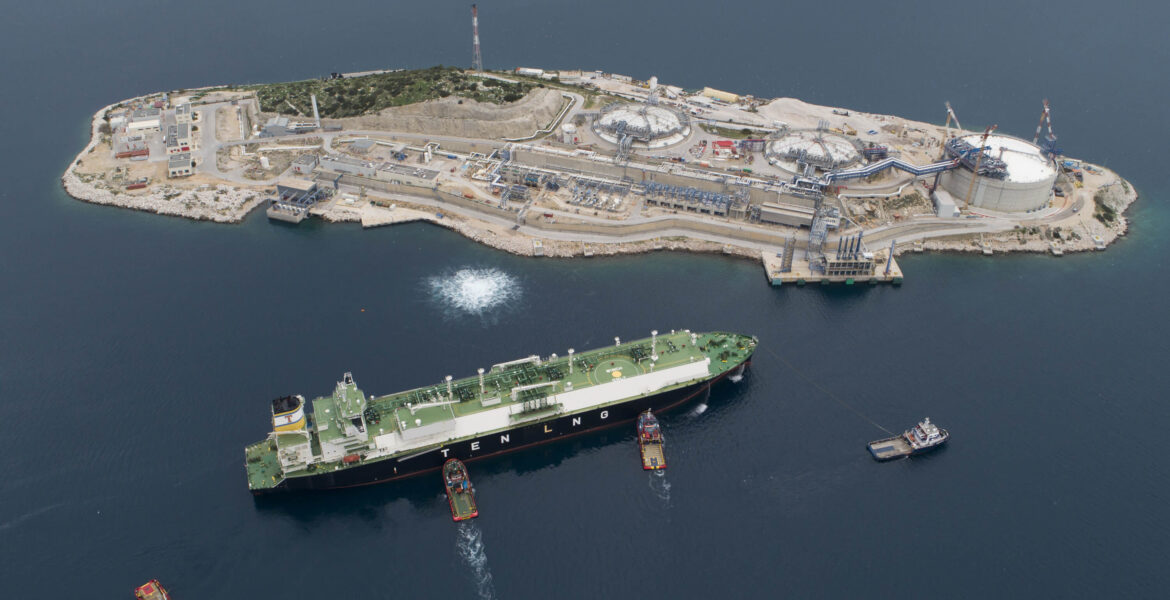The Revythousa LNG terminal was the main entry point for natural gas in Greece during the first half of 2022, covering 44% of demand, with Russian natural gas having a share of 34%, National Natural Gas System Operator DESFA said on Tuesday.
In a report, DESFA said that domestic consumption of natural gas fell, although demand rose as exports more than doubled in the January-June period. Exports were made mostly to Bulgaria and Italy.
Total demand (domestic consumption and exports) of natural gas rose 3.84% to 38.91 TWh, from 37.47 TWh in the same period last year. Domestic consumption fell 10.33% to 30.31 TWh, while exports soared 134.33% to 8.60 TWh.
Natural gas imports totaled 38.92 TWh in the first half of 2022, up 3.65% from the same period in 2021, with imports from Revythousa accounting for 44.5% of total imports.
A total of 39 tankers from six countries transferred around 16.61 TWh of LNG in the January-June period, reflecting LNG shipments from the United States (9.79 TWh). The US accounted for 58.94% of LNG imports to Greece, followed by Algeria, Egypt, Nigeria, Oman and Indonesia.
Consumption by households and enterprises grew 8.42% in the first half totaling 8.24 TWh or 27.19% of total demand. Consumption by domestic industries totaled 1.67 TWh, down 71.06% or 5.51% of total demand.
Meanwhile, the government is listening closely to the citizens' fears and concerns and Prime Minister Kyriakos Mitsotakis - except during the period of lockdown - has not shut himself away in the halls of power but striven constantly to be in contact with the people, government spokesperson Yiannis Economou said in an interview with SKAI radio on Tuesday.
"The truth is that during the period of Covid we were deprived of communication and contact with the people. For the coming period the prime minister will do both," Economou said.
"He will perform his duties as he should, on the one hand, managing the government's work, its priorities and reforms and representing the country abroad, as he has done successfully over the previous period and as is required of the Greek prime minister, of the leader of a country with the geographical position and the neighbours that Greece has in the times we live through.
"On the other hand, he will be at society's side, close to the citizens. This is what we will do for all the coming period, up until the elections of 2023."
He also repeated that the prime minister was dedicated to respecting the institutions and would not "risk the credibility of the functioning of our democracy".
On energy issues, the spokesperson noted that there was no cause for panic in Greece, while noting that in the extreme scenario where the natural gas supply was cut off, the biggest blow will be to Germany, the largest economy in Europe, and the domino effect will then impact the entire world.
"It is self-evident that if the extreme scenario plays out and there is a shortage of natural gas for German households and Germany industry, with all that this means for the German economy, it is impossible for this not to impact all of the European economy," he said.
"On the other hand, our country is obviously in a much better plight, not only because it does not get natural gas from this pipeline but also because it has prepared and taken steps as far as possible. We are not at the stage where there is justified cause for panic or extreme concern."
At the same time, Economou added, Greece had to be prepared and have contingency plans for any emergency situations that may arise, keeping these up to date depending on developments, though hopefully they will never have to be used.
"We all want to hope that the suspension of the natural gas flow in Nord Stream 1 for maintenance is temporary," he added.
Regarding "imported high prices", Economou pointed out that the Greek government currently had the largest support programme for electricity, especially, in all of Europe and that it was "now time to see an effective solution from the European Commission" as the autumn approached.
He noted that the Greek government and the Greek prime minister were taking the lead in this area also.
Economou said that one parameter of the support programme since the start of the crisis was to direct the help to where it was most needed, as not all were equally impacted by high prices.
"The truth is that it now impacts more people a great deal more. It is not only the vulnerable, it is also those that we have become accustomed to calling the middle class."
With respect to electricity, especially, he said the "government's support is horizontal because the need here is horizontal. Electric power is tantamount to living decently whether your income is low, medium or slightly higher."
"This is the reality. This is why we decided this support from the start and then raised it."
This had corrected a mistake in which those with consumption exceeding 300 kWh had truly paid an exorbitant cost, with their accounts to be credited via the platform by 60 pct after the discounts of the state.
He also pointed to the suspension of the adjustment clause for electricity bills and added that the philosophy of horizontal support will continue as long as prices remain high.
READ MORE: Greece calls on Europe to do more on energy security.


